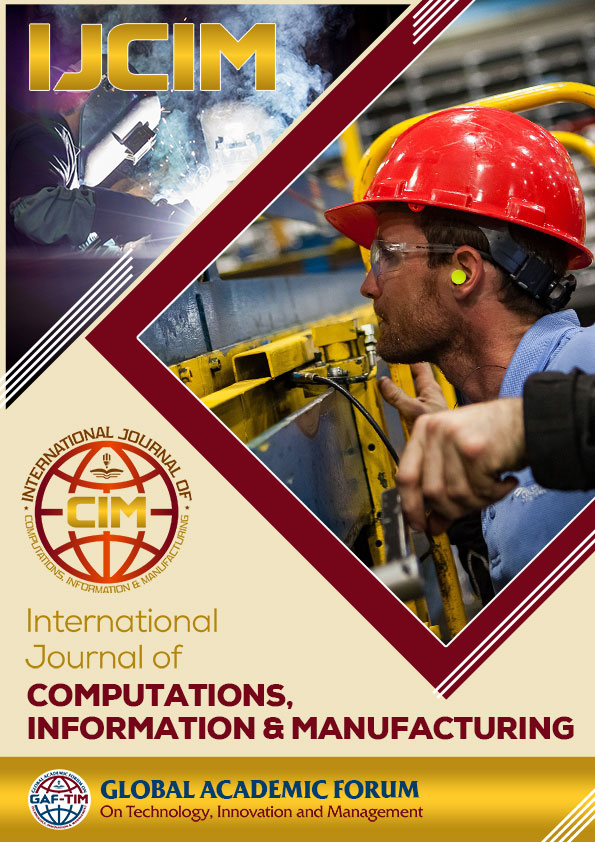From Classrooms to Cyberspace: Understanding Pedagogical Approaches and Outcomes in Metaverse Learning Environments
DOI:
https://doi.org/10.54489/xk4g2v94Keywords:
Metaverse, Learning Environments, Virtual Reality, Virtual Classrooms, Interactive SimulationsAbstract
In recent years, the educational landscape has undergone a seismic shift propelled by the emergence of metaverse learning environments. This transformative phenomenon has sparked widespread interest and prompted scholars to delve deeper into its intricacies. Our research sets out to meticulously explore and comprehend the diverse pedagogical methodologies adopted within these cyberspatial realms, with a keen focus on unraveling their outcomes and implications for education.
As we embark on this scholarly journey, we recognize the need to contextualize the evolution from traditional brick-and-mortar classrooms to the dynamic expanse of cyberspace. This transition marks not only a shift in physical setting but also a fundamental reimagining of educational paradigms. Thus, our study endeavors to trace this trajectory, shedding light on the nuanced interplay between pedagogy, technology, and learning outcomes within metaverse environments.
Employing an interdisciplinary approach, we aim to dissect the multifaceted nature of metaverse learning, transcending disciplinary boundaries to gain a comprehensive understanding. This entails delving into the immersive and collaborative dimensions of these digital realms, exploring how they shape the educational experience and foster innovative pedagogical practices.
Moreover, our research seeks to uncover the transformative potential inherent in metaverse learning environments. By critically analyzing their affordances and limitations, we aim to offer insights into how these digital platforms can revolutionize education, paving the way for a more inclusive, engaging, and effective learning experience.
In essence, our study aspires to contribute to the ongoing discourse surrounding the future of education in the digital age. By interrogating the complexities of metaverse learning through a rigorous scholarly lens, we endeavor to chart a path forward that harnesses the full potential of these emerging technologies for the betterment of education
References
Onu, P., Pradhan, A. & Mbohwa, C. Potential to use metaverse for future teaching and learning. Educ Inf Technol (2023). https://doi.org/10.1007/s10639-023-12167-9.
Parsons, D., Inkila, M., & Lynch, J. (2019). Navigating learning worlds: Using digital tools to learn in physical and virtual spaces. Australasian Journal of Educational Technology, 35(4).
Warburton, S. (2009). Second Life in Higher Education: Assessing the Potential for and the Barriers to Deploying Virtual Worlds in Learning and Teaching. British Journal of Educational Technology, 40, 414-426. https://doi.org/10.1111/j.1467-8535.2009.00952.x.
Bahari, A. (2022). Affordances and challenges of teaching language skills by virtual reality: A systematic review (2010–2020). E-Learning and Digital Media, 19(2), 163-188. https://doi.org/10.1177/20427530211036583.
Çelik, F., Baturay, M.H. The effect of metaverse on L2 vocabulary learning, retention, student engagement, presence, and community feeling. BMC Psychol 12, 58 (2024). https://doi.org/10.1186/s40359-024-01549-4.
Li M, Yu Z. A systematic review on the metaverse-based blended English learning. Front Psychol. 2023 Jan 6;13:1087508. doi: 10.3389/fpsyg.2022.1087508. PMID: 36687938; PMCID: PMC9852895.
Sharma, A., Sharma, L., Krezel, J. (2023). Exploring the Use of Metaverse for Collaborative Learning in Higher Education: A Scoping Review. In: Zaphiris, P., et al. HCI International 2023 – Late Breaking Papers. HCII 2023. Lecture Notes in Computer Science, vol 14060. Springer, Cham. https://doi.org/10.1007/978-3-031-48060-7_19.
Maraza-Quispe, B., Caytuiro-Silva, N., Castro-Gutierrez, E., Alejandro-Oviedo, M., Choquehuanca-Quispe, W., Fernandez-Gambarini, W., Cuadros-Paz, L., & Cisneros-Chavez, B. (2019). Towards the development of collaborative learning in virtual environments. International Journal of Advanced Computer Science and Applications, 10(12), 270-276. https://doi.org/10.14569/ijacsa.2019.0101237.
James Calvert, Rhodora Abadia, Impact of immersing university and high school students in educational linear narratives using virtual reality technology, Computers & Education, ISSN 0360-1315, https://doi.org/10.1016/j.compedu.2020.104005.
M. Boni, ‘ETHICAL CHALLENGES RELATED TO THE METAVERSE DEVELOPMENT - HYPOTHESIS’, Ethics - Scientific Research, Ethical Issues, Artificial Intelligence and Education [Working Title]. IntechOpen, Mar. 08, 2023. doi: 10.5772/intechopen.1001112.
Yogesh K. Dwivedi, et al.,(2022). Metaverse beyond the hype: Multidisciplinary perspectives on emerging challenges, opportunities, and agenda for research, practice and policy, International Journal of Information Management, Vol 66, ISSN 0268-4012,.
Guerra-Tamez, C.R. The Impact of Immersion through Virtual Reality in the Learning Experiences of Art and Design Students: The Mediating Effect of the Flow Experience. Educ. Sci. 2023, 13, 185. https://doi.org/10.3390/educsci13020185.
Haugland, M.J., Rosenberg, I. & Aasekjær, K. Collaborative learning in small groups in an online course – a case study. BMC Med Educ 22, 165 (2022). https://doi.org/10.1186/s12909-022-03232-x.
Ekta Sinha, ‘Co-creating’ experiential learning in the metaverse- extending the Kolb's learning cycle and identifying potential challenges, The International Journal of Management Education, Vol 21, Issue 3, 2023, ISSN 1472-8117, https://doi.org/10.1016/j.ijme.2023.100875.
Jin, Y., Tiejun, Z. The application of Metaverse XiRang game in the mixed teaching of art and Design in Colleges and Universities. Educ Inf Technol 28, 15625–15655 (2023). https://doi.org/10.1007/s10639-023-11844-z.
Marougkas, A.; Troussas, C.; Krouska, A.; Sgouropoulou, C. Virtual Reality in Education: A Review of Learning Theories, Approaches and Methodologies for the Last Decade. Electronics 2023, 12, 2832. https://doi.org/10.3390/electronics12132832.
Gligorea, I.; Cioca, M.; Oancea, R.; Gorski, A.-T.; Gorski, H.; Tudorache, P. Adaptive Learning Using Artificial Intelligence in e-Learning: A Literature Review. Educ. Sci. 2023, 13, 1216. https://doi.org/10.3390/educsci13121216
Imannezhad Sh, Vahedian-Shahroodi M, Shariati kh, Mansourzadeh A, Saeedi M. Metaverse in Education; an Overview of Systematic Reviews. Med Edu Bull 2023; 4(2): 731-43. DOI: 10.22034/MEB.2023.405301.1079.
Chamipa Phanudulkitti, Surangkana Puengrung, Rittnarong Meepong, Kathryn Vanderboll, Karen Bell Farris, Sarah E. Vordenberg, A systematic review on the use of virtual patient and computer-based simulation for experiential pharmacy education, Exploratory Research in Clinical and Social Pharmacy, Vol 11, 2023, ISSN 2667-2766, https://doi.org/10.1016/j.rcsop.2023.100316.
Smiderle, R., Rigo, S.J., Marques, L.B. et al. The impact of gamification on students’ learning, engagement and behavior based on their personality traits. Smart Learn. Environ. 7, 3 (2020). https://doi.org/10.1186/s40561-019-0098-x
Allmendinger, K., Kempf, F., Hamann, K. (2009). Collaborative Learning in Virtual Classroom Scenarios. In: Cress, U., Dimitrova, V., Specht, M. (eds) Learning in the Synergy of Multiple Disciplines. EC-TEL 2009. Lecture Notes in Computer Science, vol 5794. Springer, Berlin, Heidelberg. https://doi.org/10.1007/978-3-642-04636-0_33
Saeed Banaeian Far, Azadeh Imani Rad, Seyed Mojtaba Hosseini Bamakan, Maryam Rajabzadeh Asaar, Toward Metaverse of everything: Opportunities, challenges, and future directions of the next generation of visual/virtual communications, Journal of Network and Computer Applications, Vol 217, 2023, ISSN 1084-8045, https://doi.org/10.1016/j.jnca.2023.103675
Fanar S. (2023). Harnessing digital issue in adopting metaverse technology in higher education institutions: Evidence from the United Arab Emirates. International Journal of Data and Network Science, 8(1):1-16.
Aljuhani, K., Sonbul, M., Althabiti, M. et al. Creating a Virtual Science Lab (VSL): the adoption of virtual labs in Saudi schools. Smart Learn. Environ. 5, 16 (2018). https://doi.org/10.1186/s40561-018-0067-9.
SOELISTYA, Djoko et al. The Effect of Immersive Learning on Students' Cognitive and Affective Aspects. Studies in Media and Communication, [S.l.], v. 11, n. 5, p. 79-84, apr. 2023. ISSN 2325-808X.
Monaco, S.; Sacchi, G. Travelling the Metaverse: Potential Benefits and Main Challenges for Tourism Sectors and Research Applications. Sustainability 2023, 15, 3348. https://doi.org/10.3390/su15043348.
KARAMERT, Ö., & KUYUMCU VARDAR, A. (2021). The effect of gamification on young mathematics learners’ achievements and attitudes. Journal of Educational Technology and Online Learning, 4(2), 96-114. https://doi.org/10.31681/jetol.904704.
Peterková, J.; Repaská, Z.; Prachařová, L. Best Practice of Using Digital Business Simulation Games in Business Education. Sustainability 2022, 14, 8987. https://doi.org/10.3390/su14158987.











